If you’re considering adding a new furry member to your family, king shepherd puppies are definitely worth considering. These majestic and intelligent dogs make excellent companions and are known for their loyalty, versatility, and protective nature. In this article, we will explore everything you need to know about king shepherd puppies, from their origins and characteristics to their care and training.
Basic Information about King Shepherd puppies
| Basic Info | Details |
|---|---|
| Dog Colour | King Shepherds come in a variety of colors including solid black, grey, brown, and yellow, tricolor (black, white, and brown or red), or sable (black and red, silver, or tan). |
| Weight | Males weigh between 90 to 150 pounds and females weigh between 75 to 110 pounds. |
| Size | King Shepherds are large to giant-sized breed. |
| Dog Height | Males stand between 27 to 31 inches high and females stand between 25 to 27 inches high. |
| Lifespan | The average lifespan of a King Shepherd is between 10 to 14 years. |
| Price | The price of King Shepherd puppies typically ranges from $1,500 to $3,000 |
Origins and Characteristics
The king shepherd is a relatively new breed that originated in the United States in the 1990s. It was developed by crossing German shepherds, Alaskan malamutes, and Great Pyrenees to create a larger, more versatile working dog. King shepherds are known for their impressive size, with males typically weighing between 90 to 150 pounds and standing around 25 to 29 inches tall at the shoulder.
These puppies have a strong and muscular build, with a thick double coat that provides excellent protection against various weather conditions. Their coat can come in a variety of colors, including black, tan, sable, and cream. They have a noble and confident expression, with intelligent eyes that reflect their alertness and keen instincts.

king shepherd puppies Origins and Characteristics
Temperament and Personality
King shepherd puppies are known for their gentle and affectionate nature, making them excellent family pets. They are highly intelligent and easily trainable, making them suitable for various roles such as search and rescue, therapy work, and even competitive obedience. These puppies are fiercely loyal to their families and are known to be excellent protectors.
While they are generally friendly and sociable, proper socialization from an early age is crucial to ensure they get along well with other pets and strangers. Early training and consistent positive reinforcement are essential to help them develop into well-mannered and obedient adults.
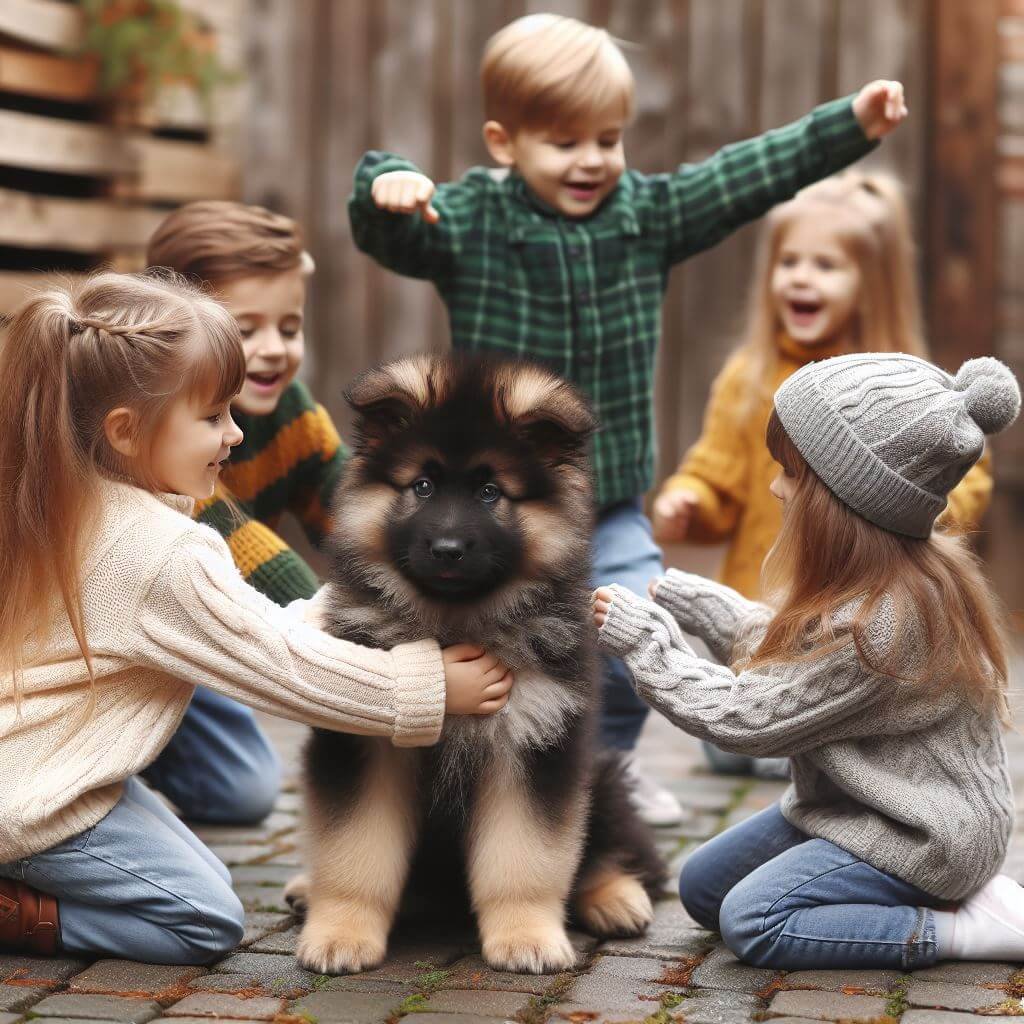
king shepherd puppies caring
Care and Exercise
King shepherd puppies require regular exercise to keep them physically and mentally stimulated. Daily walks, playtime, and interactive toys are essential to prevent boredom and destructive behavior. These puppies also thrive in activities that challenge their intelligence, such as obedience training, agility, and tracking exercises.
In terms of grooming, their thick double coat requires regular brushing to prevent matting and to keep it in optimal condition. They are moderate shedders, so expect some shedding throughout the year. Regular nail trimming, teeth brushing, and ear cleaning should also be included in their grooming routine to maintain their overall health.

king shepherd puppies Care and Exercise
Health and Lifespan
Like any breed, king shepherd puppies may be prone to certain health issues. It’s important to choose a reputable breeder who conducts health screenings and genetic testing to minimize the risk of inherited conditions. Common health concerns in this breed include hip and elbow dysplasia, bloat, and certain genetic disorders.
With proper care and a healthy lifestyle, king shepherds can have a lifespan of around 10 to 14 years. Regular veterinary check-ups, a balanced diet, and exercise are essential to keep them in optimal health and ensure they live a long and happy life.
Dog Food
The best food for your King Shepherd is raw food. A natural, whole food diet can help keep your dog healthy and happy, and prevent common health conditions such as obesity, joint, dental, and digestive issues. The best diet for a King Shepherd includes a combination of high-quality protein, healthy fats, vitamins, minerals, and fiber from vegetables and berries.
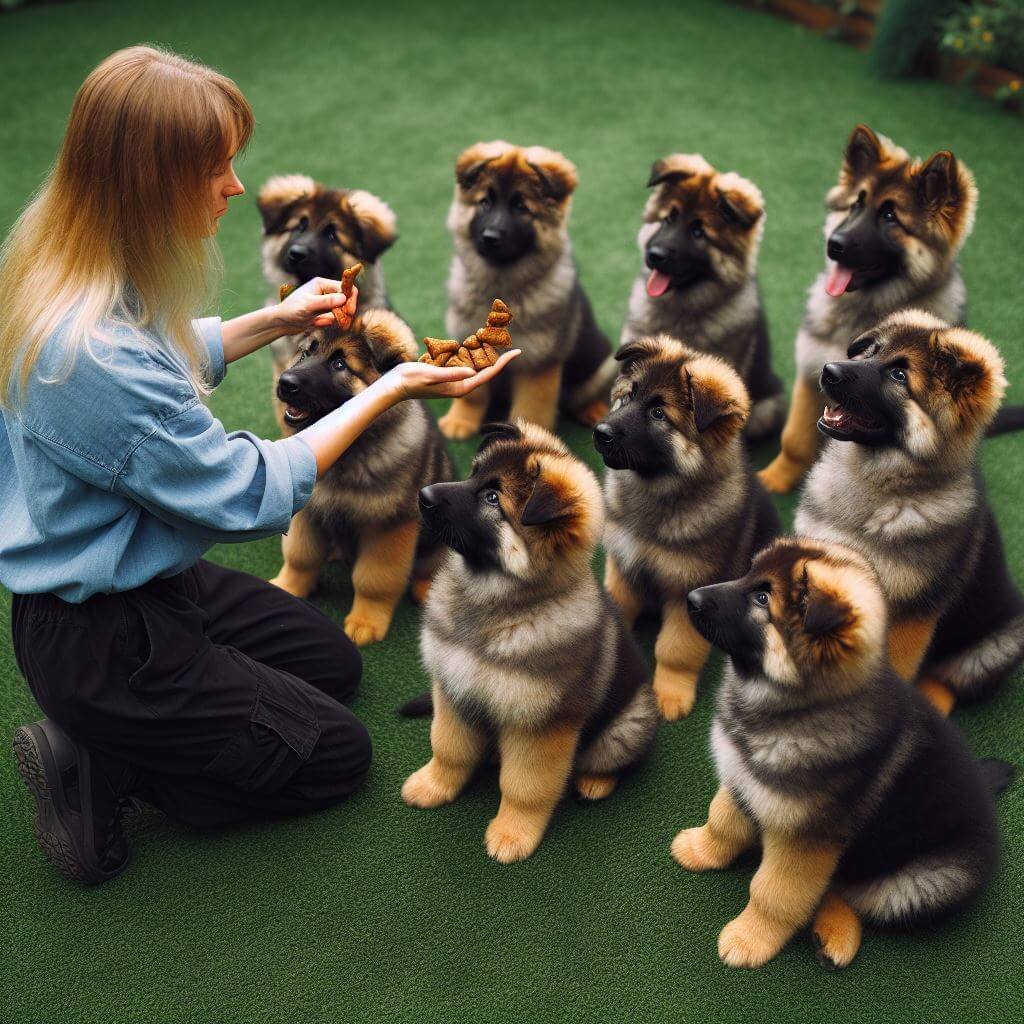
king shepherd puppies Dog Food
Diet
King Shepherds require a lot of food due to their size. The use of healthy brands is vital. While puppies should be fed multiple times a day, adult King Shepherds typically do well on two meals a day.
Grooming
King Shepherds have moderately thick fur that needs to be brushed regularly. Some King Shepherds have longer fur and require more frequent grooming. Brush the King Shepherd’s fur at least three times per week, or every day during the spring and fall shedding seasons.
Read more: The Art of Dog Grooming
Training
King Shepherds are highly intelligent dogs, making training relatively simple for owners that are consistent and engaging. Basic obedience lessons can start in puppyhood between eight and 16 weeks of age, while more involved training should continue through the dog’s life.
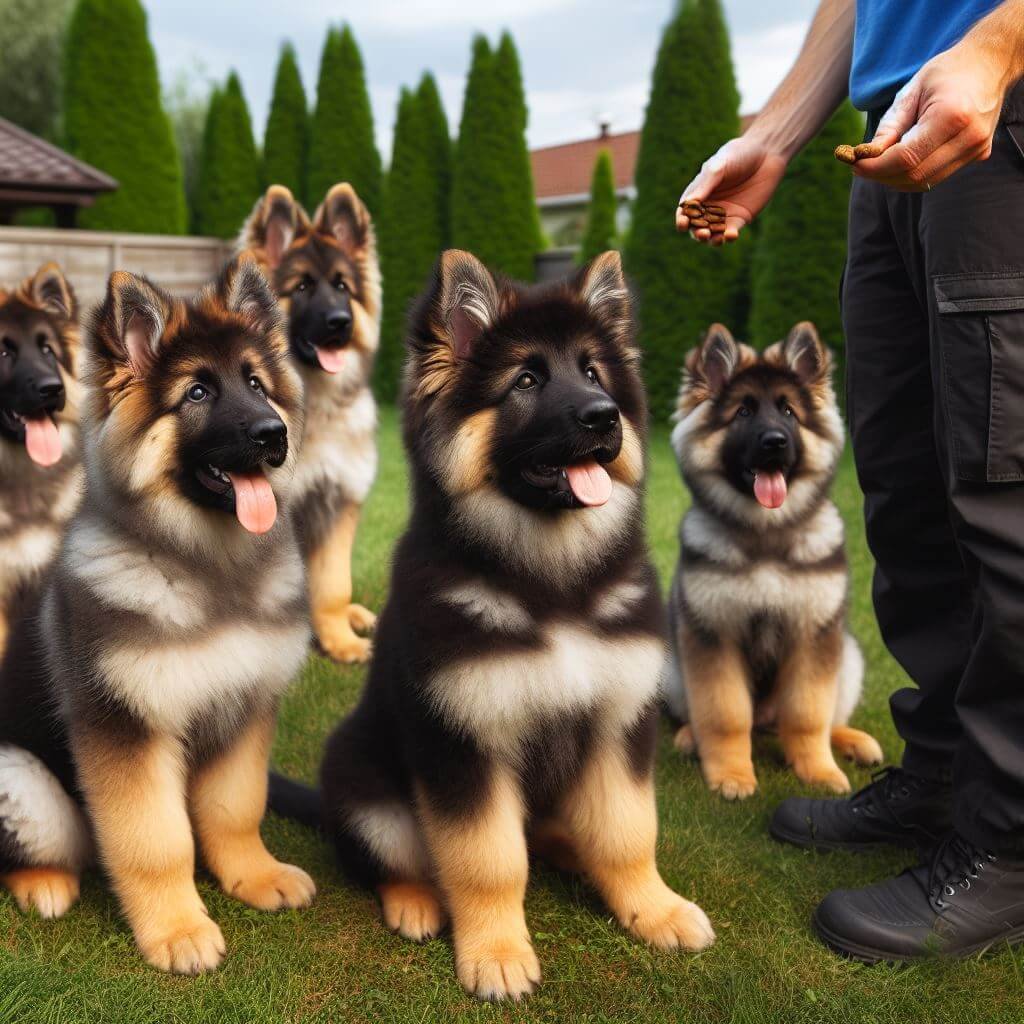
king shepherd puppies Training
Exercise
King Shepherds are a high-energy breed that needs extensive exercise. Strenuous activity for at least one hour per day is a must. They usually require up to 1 to 1.5 hours of exercise and training daily.
Socialization
King Shepherds often have protective instincts, and some can be on the shyer side. Therefore, it’s important to start socialization early. Socialization simply involves introducing your dog to as many situations as possible.
Read more: The Importance of Dog socialization
Communication
King Shepherds are known for their loving personalities. They’re loyal and protective — some even serve as personal protection dogs. They will tolerate strangers, but they can be a bit standoffish.
Care Taker
King Shepherds are strong dogs who benefit from early socialization and training. Even older dogs can take to training. King Shepherds combine high intelligence and an eagerness to please, making them a relatively easy breed to train.
Fun Facts About Dogs
King Shepherds are a relatively new breed. They are a mix of American German shepherds, European German shepherds, Shiloh shepherds (a cross between German shepherds and Alaskan malamutes), and Great Pyrenees. They are known for their loving personalities, like their German shepherd counterparts.
Senior Dog Care and Considerations
As King Shepherds age, their care needs may change. Regular veterinary check-ups are important to monitor their health. Adjustments to their diet and exercise routines may be necessary. Mental stimulation remains important throughout their life.
Technology and Dogs
Technology can aid in the care and training of King Shepherds. Tools such as GPS trackers, automatic feeders, and training apps can be beneficial. Always consult with a veterinarian or a professional dog trainer when introducing new tools or technology.
Dog-Friendly Travel and Accommodations
When traveling with a King Shepherd, consider their size and exercise needs. Ensure accommodations are dog-friendly and have enough space. Keep their routine as consistent as possible to reduce stress.
Games
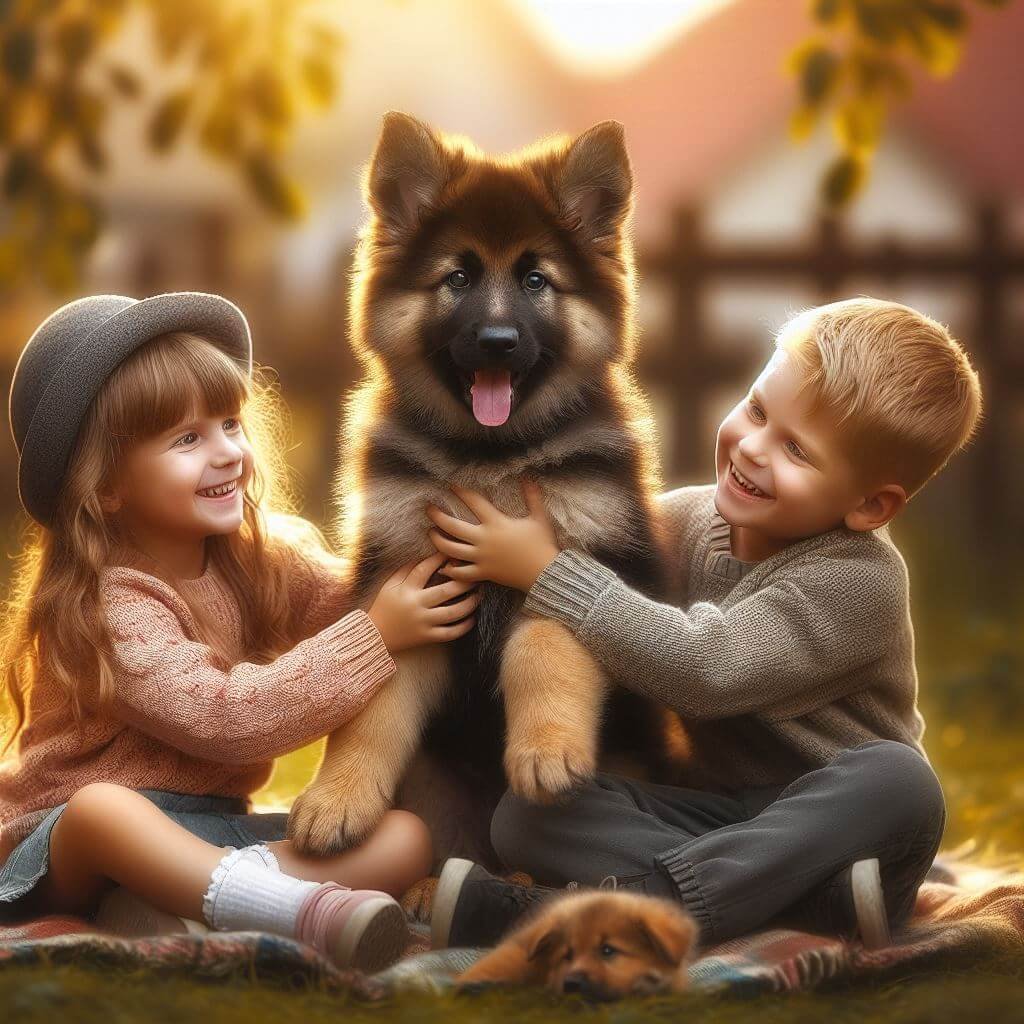
king shepherd puppies playing games
| Indoor Games | Outdoor Games |
|---|---|
| Fetch | Agility Training |
| Tug-of-War | Fetch |
| Hide and Seek | Tug-of-War |
These games are great ways to keep King Shepherd puppies entertained and exercised. They can become bored very easily, so it’s vital to keep them engaged.
Remember, always supervise your puppy during playtime to ensure their safety. Enjoy your time with your King Shepherd puppy! 🐶
Conclusion
King shepherd puppies are a wonderful choice for those seeking a loyal, intelligent, and versatile companion. With their regal appearance and gentle nature, they make excellent family pets and are well-suited for various roles. However, it’s important to remember that owning a king shepherd comes with responsibilities, such as proper training, socialization, and regular exercise. If you’re ready to provide the love and care these puppies deserve, they will undoubtedly bring joy and happiness to your life for years to come.

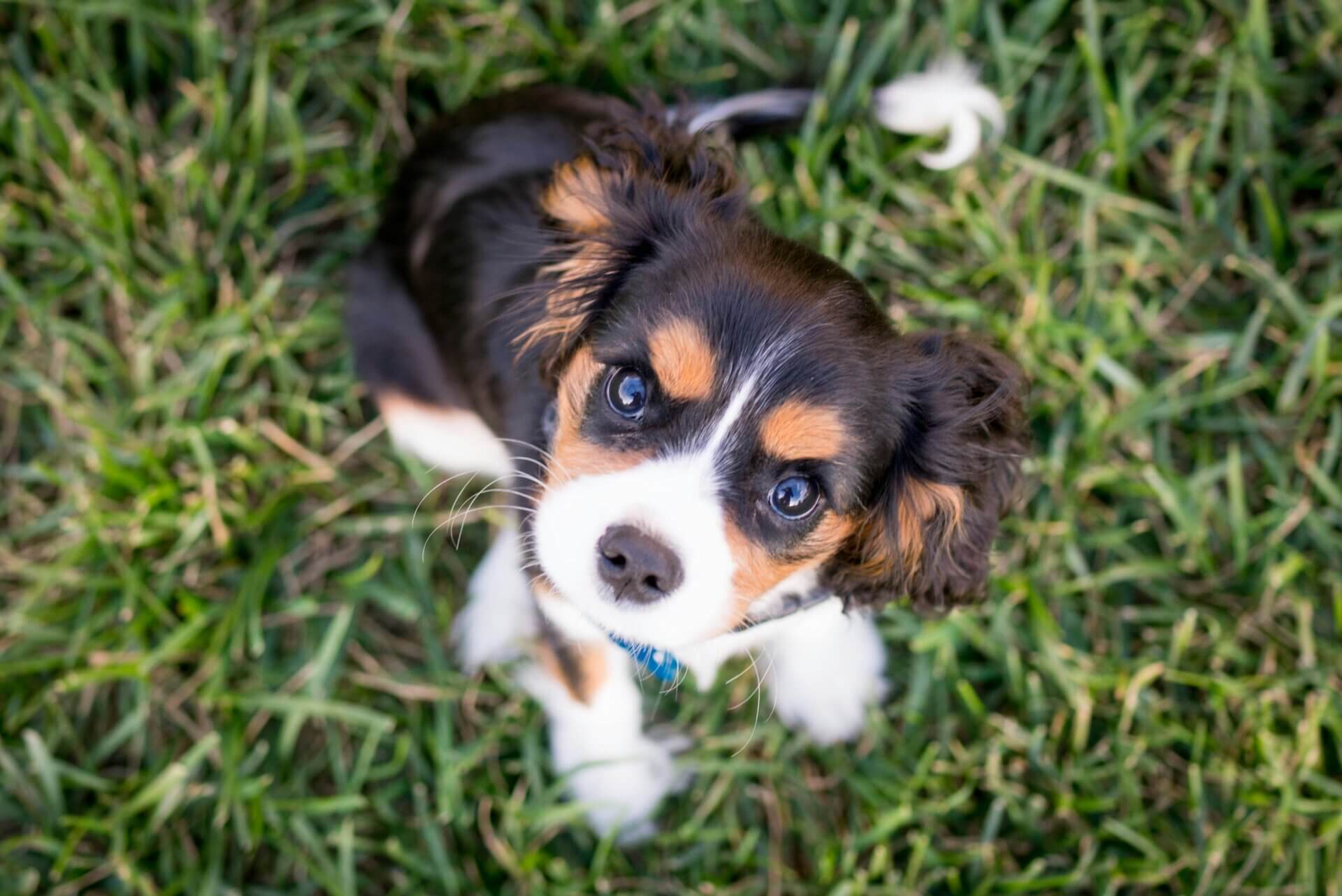
 Mini Labradoodle: A Complete Guide
Mini Labradoodle: A Complete Guide  Dapple Dachshund: A Unique and Lively Breed
Dapple Dachshund: A Unique and Lively Breed 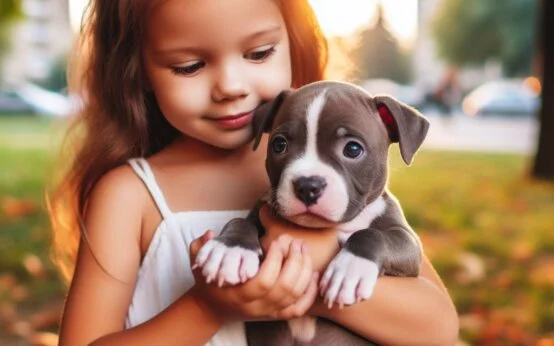 Pocket Pitbull: A Compact Canine Companion
Pocket Pitbull: A Compact Canine Companion 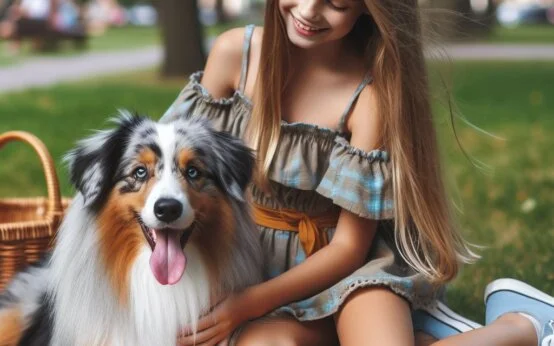 The Blue Merle Australian Shepherd: A Captivating and Unique Breed
The Blue Merle Australian Shepherd: A Captivating and Unique Breed 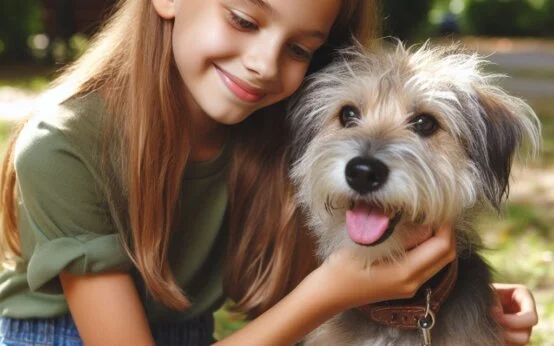 Terrier Mix: A Versatile and Energetic Canine Companion
Terrier Mix: A Versatile and Energetic Canine Companion 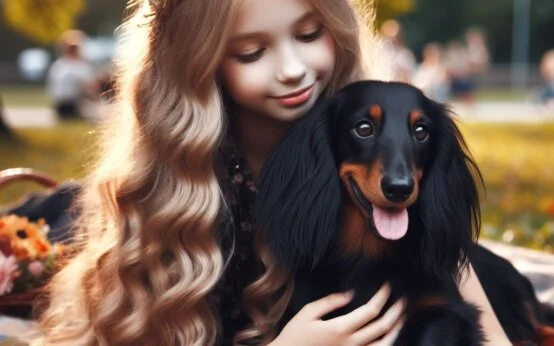 Long Haired Dachshund: A Guide to This Charming Breed
Long Haired Dachshund: A Guide to This Charming Breed  Mini Labradoodle: A Complete Guide
Mini Labradoodle: A Complete Guide  Dapple Dachshund: A Unique and Lively Breed
Dapple Dachshund: A Unique and Lively Breed  Pocket Pitbull: A Compact Canine Companion
Pocket Pitbull: A Compact Canine Companion  Preparing for an Adventure: A Golden Retriever Packs Its Suitcase
Preparing for an Adventure: A Golden Retriever Packs Its Suitcase  The Blue Merle Australian Shepherd: A Captivating and Unique Breed
The Blue Merle Australian Shepherd: A Captivating and Unique Breed  Long Haired Dachshund: A Guide to This Charming Breed
Long Haired Dachshund: A Guide to This Charming Breed